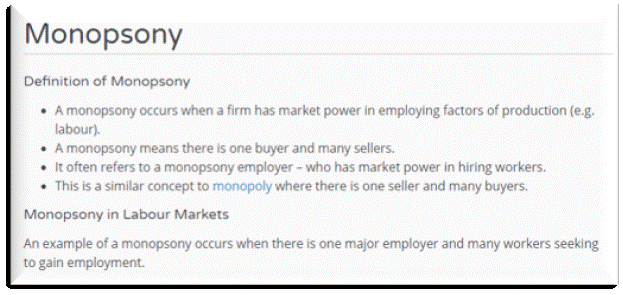 It appears that, at long last and despite the best efforts of American businesses to prolong it, monopsony may be on the way out. R.I.P. and good riddance.
It appears that, at long last and despite the best efforts of American businesses to prolong it, monopsony may be on the way out. R.I.P. and good riddance.
Desperate for Work
Monopsony occurs when the economy has more workers than jobs for them to fill. This gives the employers leverage, which they use to depress wages and benefits artificially for as long as they can get away with it.
Monopsony is why we read news articles about hundreds of people showing up to apply for 40 or even 350 jobs at a new Walmart. Those job seekers aren’t driven by a consuming desire to work for Walmart. Who would want to work for a company so cheap their full-time employees often have to collect government benefits like Medicaid and food stamps, to stay alive?
Those are usually the only jobs in town and the applicants are desperate for work.
Monopsony—and the leverage that comes with it—results from employers sending American jobs overseas, hiring H-1B workers here, and replacing human beings with software, self-service kiosks, and robots. The Wall Street Journal reports that the Union Pacific railroad was using drones to observe employees to ensure they were following safety guidelines. But the company had to ground them because they presented a safety risk. (You can’t make this stuff up.)
Companies can reinforce monopsony by destroying the labor unions that give employees leverage, enforcing non-compete clauses that prevent workers from leaving, and colluding not to hire one another’s employees. Not to mention that most workers are employees at will, who can be fired at any time for any reason—or no reason at all.
The Goldilocks Hiring Syndrome
These efforts work to keep wages and benefits low, but they also depress the economy. When workers have flat wages that don’t grow year over year, despite inflation, they can’t purchase the goods and services that keep the economy humming. So, monopsony may drive a vicious circle that helps only the senior managers who collect huge compensation packages and the shareholders of their companies.
 Monopsony also enables the “Goldilocks Hiring Syndrome,” in which hiring managers search for the perfect candidate, one who possesses every single item on the Must-Have, Nice-to-Have and Kitchen-Sink portions of a job description. Once upon a time, hiring managers would move ahead with an imperfect candidate with good prospects for future development. When they have an army of candidates to choose from, however, they take forever and a day to find absolute perfection, perpetuating the negative economic effects.
Monopsony also enables the “Goldilocks Hiring Syndrome,” in which hiring managers search for the perfect candidate, one who possesses every single item on the Must-Have, Nice-to-Have and Kitchen-Sink portions of a job description. Once upon a time, hiring managers would move ahead with an imperfect candidate with good prospects for future development. When they have an army of candidates to choose from, however, they take forever and a day to find absolute perfection, perpetuating the negative economic effects.
In this dynamic, anyone who is over 50, out of work for any reason, not quite perfect, highly experienced, often female or a person of color, need not apply. Companies can afford to be picky and they are. “A good fit with the company” often means male, white, and young.
Want to change industries, try a different line of work, learn a new skill, downsize your workweek, or shift your focus? Forget it.
The Beginning of the End of Monopsony
Now, finally, a tight economy may crack the hiring ice. As Bloomberg News tells us, “Obsession for the Perfect Worker is Fading in Tight U.S. Job Market.” Yet, hiring managers cling to a narrow view of what constitutes an eligible candidate. Authors Craig Torres and Jordan Yadoo say,“Firms still remain reluctant to boost pay or train employees with less-than-perfect credentials, though recruiters say that may have to change amid a jobless rate that’s set to dip further.”
The economy has reached full employment: an unemployment rate of 4.1%. In a booming economy, hunting for a Purple Squirrel won’t get you much.
In their report on Toughest Jobs to Fill 2018, CareerCast identifies the top 10 jobs with more open slots than candidates. Half of them are in the health care industry. CareerCast also lists several reasons why employers have trouble filling positions: not enough people with the skills to fill the job, a lack of new graduates in the profession, and industry growth. These are not problems, they are opportunities. Now is the time to break with generally accepted hiring practices and get creative. The hiring manager who can see beyond monopsony will win, big time.
Hiring Outside the Box
 For several months, industry experts, business publications, and economists have been urging companies to be more flexible in their hiring requirements. They recommend that hiring managers think outside the box and:
For several months, industry experts, business publications, and economists have been urging companies to be more flexible in their hiring requirements. They recommend that hiring managers think outside the box and:
- Consider non-traditional experience
- Look at alternative degrees
- Search for self-starters
- Go beyond the resume
- Find a good work ethic
- Keep an open mind
- Avoid extended interview cycles
I add the three that always worked for me when I was a hiring manager.
- Hire a person with potential
- Who has 80% of the requirements and
- Train for the other 20%.
Demographics: The Monopsony Killer
 Monopsony won’t work in the long run, either. Hiring managers will have to change their modus operandi as time goes along, and not just because of a strong economy.
Monopsony won’t work in the long run, either. Hiring managers will have to change their modus operandi as time goes along, and not just because of a strong economy.
The U.S. Census Bureau tells us that people over 65 will outnumber children by 2035. Monopsony won’t work when most of the work force is graying out. By then, leverage will have shifted from hiring companies to job seekers.
Companies have 17 years to figure out how to respond.


There’s also the case that hiring someone to do the very same job they just left – i.e., the “perfect fit” – will result in that person not having a chance to grow.
And there’s the perspective of not knowing what can’t be done yet.
The Perfect Fit, Isn’t
https://www.asktheheadhunter.com/gv060106.htm